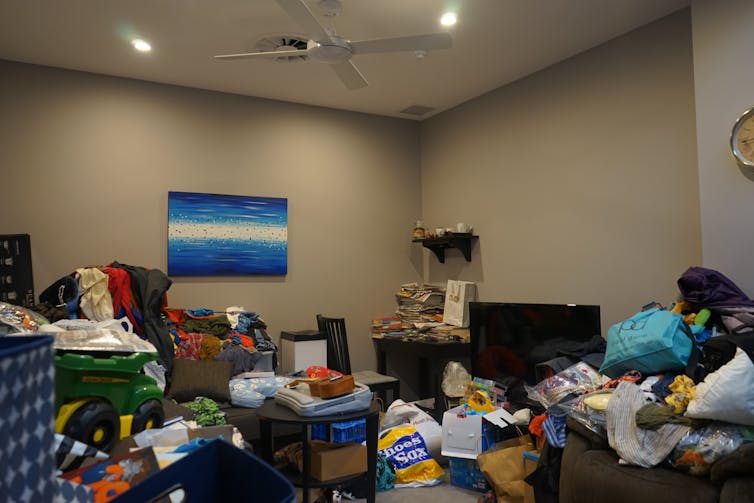When possessions are poor substitutes for people: hoarding disorder and loneliness
- Written by Melissa Norberg, Associate Professor in Psychology, Macquarie University
A decomposed, mummified body of a man was recently found by forensic cleaners in a Sydney apartment. The apartment’s owner is thought to have suffered from hoarding disorder, and police believe the decomposed body had been there for more than ten years.
We occasionally read stories involving people with hoarding disorder - people whose possessions pose a serious burden. Clutter might prevent them from sitting on their sofa, taking a shower, cooking a meal, or sleeping in their bed.
Read more: When stuff gets in the way of life: hoarding and the DSM-5
Despite the lack of space, they find it impossible to part with items they don’t need. Why is it so hard for them to let go of their possessions?
Loving things
 Children hold onto teddy bears to feel secure.
from shutterstock.com
Children hold onto teddy bears to feel secure.
from shutterstock.com
As children, we use possessions to comfort ourselves when our parents are unavailable. By the time we reach adulthood, most of us have abandoned our security blankets and teddy bears. We might occasionally buy something unnecessary or hang on to a few items we no longer need.
In most cases, these few extra possessions don’t pose a problem. We store them in the closet or display them proudly on a shelf. But our stuff never creeps beyond that point. We have a few treasured objects, but we don’t rely on them to make us feel good – at least not on a regular basis.
It’s a different story for the 1.2 million Australians who meet the DSM-5 criteria for hoarding disorder. These include:
- difficulty discarding items regardless of their actual value
- a perceived need to save the items and associated distress at the idea of losing them
- clutter that prevents using the home being used for its intended purpose.
Hoarding disorder leads to a quality of life as poor as that of people with schizophrenia. Clutter increases the risks of injury, medical conditions, and death.
A quarter to a third of Australian residential fire-related deaths are associated with hoarding disorder.
For those with hoarding disorder, possessions remind them of the past and foreshadow a potential future. They can remember their child wearing that outfit or playing with that toy. They are certain that jug will be useful some day, despite having many other jugs they have never used. They are extremely attached to their possessions for one reason or another.
Read more: Explainer: what is an anxiety disorder?
Just thinking about disposing of their items makes people with hoarding disorder feel highly anxious. Their anxiety is similar to what others may feel about giving a speech or finding a spider in their shoe. Believing they can’t cope with the distress of losing their possessions, they hang on tightly. Doing so unfortunately strengthens their beliefs that their possessions are needed.
Objects as human substitutes
If children regularly use objects for comfort during times of need, why doesn’t everyone have a hoarding problem? We think it is because some people are more prone to anthropomorphism. Anthropomorphism is when an object is perceived to have human-like qualities.
Humans need to be connected physically, socially, and psychologically to other humans. This need is just as important as the need for air, water, food, and shelter. Loneliness negatively affects our health and is a risk factor for early death. Understandably, when we feel devalued or unloved, we seek out closeness. When our need isn’t met by humans, objects may serve as a substitute.
Read more: The deadly truth about loneliness
Individuals who hoard items tend to experience interpersonal difficulties, feel insecure in relationships, and believe themselves to be a burden to others. To compensate for unmet social needs, they anthropomorphise objects to feel connected.
Anthropomorphism doesn’t fully meet people’s needs, so they collect more and more objects. Stronger anthropomorphic tendencies are associated with more compulsive buying and greater acquisition of free stuff.
 Clutter that sufficiently prevents the use of the living room for its original purpose.
A/Prof Melissa Norberg
Clutter that sufficiently prevents the use of the living room for its original purpose.
A/Prof Melissa Norberg
The current treatment approach teaches individuals how to challenge their beliefs about possessions. It also teaches them how to resist acquiring urges and how to sort, organise, and discard possessions. This approach helps only about a quarter of people who receive it.
We used to think social disconnection was a consequence of hoarding. Now, we think it may be part of the cause. At Lifeline Harbour to Hawkesbury, Macquarie University, and UNSW, we are piloting an enhanced hoarding treatment. This treatment addresses core hoarding problems as well as helping to improve impaired social connections.
The consequences of hoarding escalate as people get older. Without treatment, the consequences (such as fire) of hoarding disorder costs Australia an estimated A$36,880 per person, per occurrence. If we can help people feel valued and loved, they may benefit more from treatment. In turn, they may experience a desperately needed improvement in their quality of life.
Authors: Melissa Norberg, Associate Professor in Psychology, Macquarie University


















